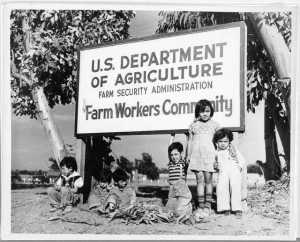Latino Youth Among Last Child Laborers In U.S.
 Earlier this month, “The Harvest,” a film about underage farmworkers debuted in theaters in New York and Los Angeles. Following three workers ages 12-16, the film documents their daily lives in which they wake before sunrise, skip school for work in the fields, and spend the day laboring under the blazing sun picking produce in exchange for as little as $60 a week.
Earlier this month, “The Harvest,” a film about underage farmworkers debuted in theaters in New York and Los Angeles. Following three workers ages 12-16, the film documents their daily lives in which they wake before sunrise, skip school for work in the fields, and spend the day laboring under the blazing sun picking produce in exchange for as little as $60 a week.
As highlighted in a recent report on “60 Minutes,” youth labor on farms is nothing new in America. Many other Americans, including those who weren’t children or grandchildren of migrant laborers like those depicted in the story, also worked in the fields to help support their families. Though the work is extremely difficult, physically strenuous, and at times risky, many adult farmworkers depend on the income their children bring in to survive.
The reason kids are allowed to work at very young ages and in unsafe conditions, is a legal loophole under Fair Labor Standards Act of 1938, in which underage farmworkers have very little rights. The act established a minimum age (14), a minimum wage and maximum number of work hours per week for most children, but exempted agriculture since many farms were family-owned and depended on offspring to keep them running. Since then, the American economy has changed drastically and corporations have used the loophole to benefit from inexpensive child labor.
Which is why Congresswoman Lucille Roybal-Allard (CA-34) introduced the Children’s Act for Responsible Employment, (CARE H.R. 3654), to Congress in 2009, to help protect children who work in fields. CARE aims to provide these underage workers, approximately 400,000 – most of whom were born in the U.S., with the same rights as kids their age in other industries. According to her website, Roybal-Allard created this legislation stating:
Our farmworker children deserve the same protections given to children in other industries; if they are too young they should not be working, and if they are working, they deserve protection from long hours and unsafe work practices.
As shown in “The Harvest,” those unsafe practices include the use of unstable equipment to pick fruit from high trees and exposure to toxic chemicals. A review of the movie in vivelohoy.com quotes one 16-year-old from the film who claims the skin on his hands started to fall off due to the chemicals he worked around.
Aside from creating greater protections in the workplace, the CARE Act also aims to keep young laborers in school. In a speech on Capitol Hill in June, Roybal-Allard pointed out that, because they move with the crops from location to location, “child farmworkers drop out of school at four times the national dropout rate”, which keeps them from advancing economically in the future.
Representative Roybal-Allard has tried to introduce similar legislation to Congress since 2001, and despite all of the arguments in favor of protecting child laborers, and 107 co-sponsors, CARE has yet to become law. Until then, American consumers will continue to enjoy the fruits and vegetables of child labor.
References:

